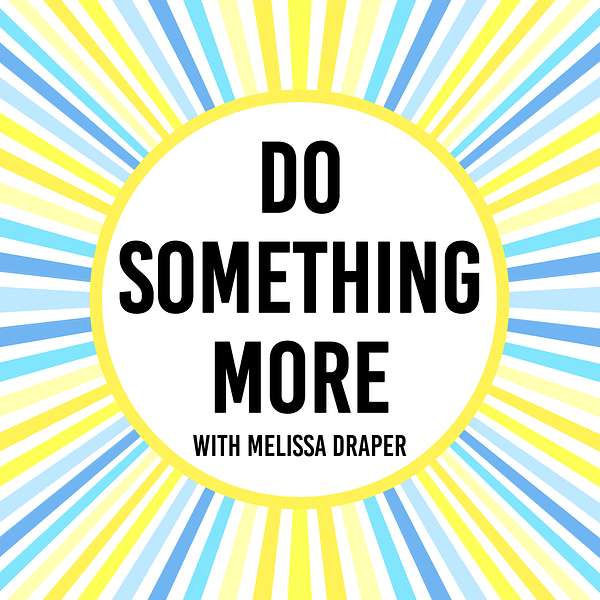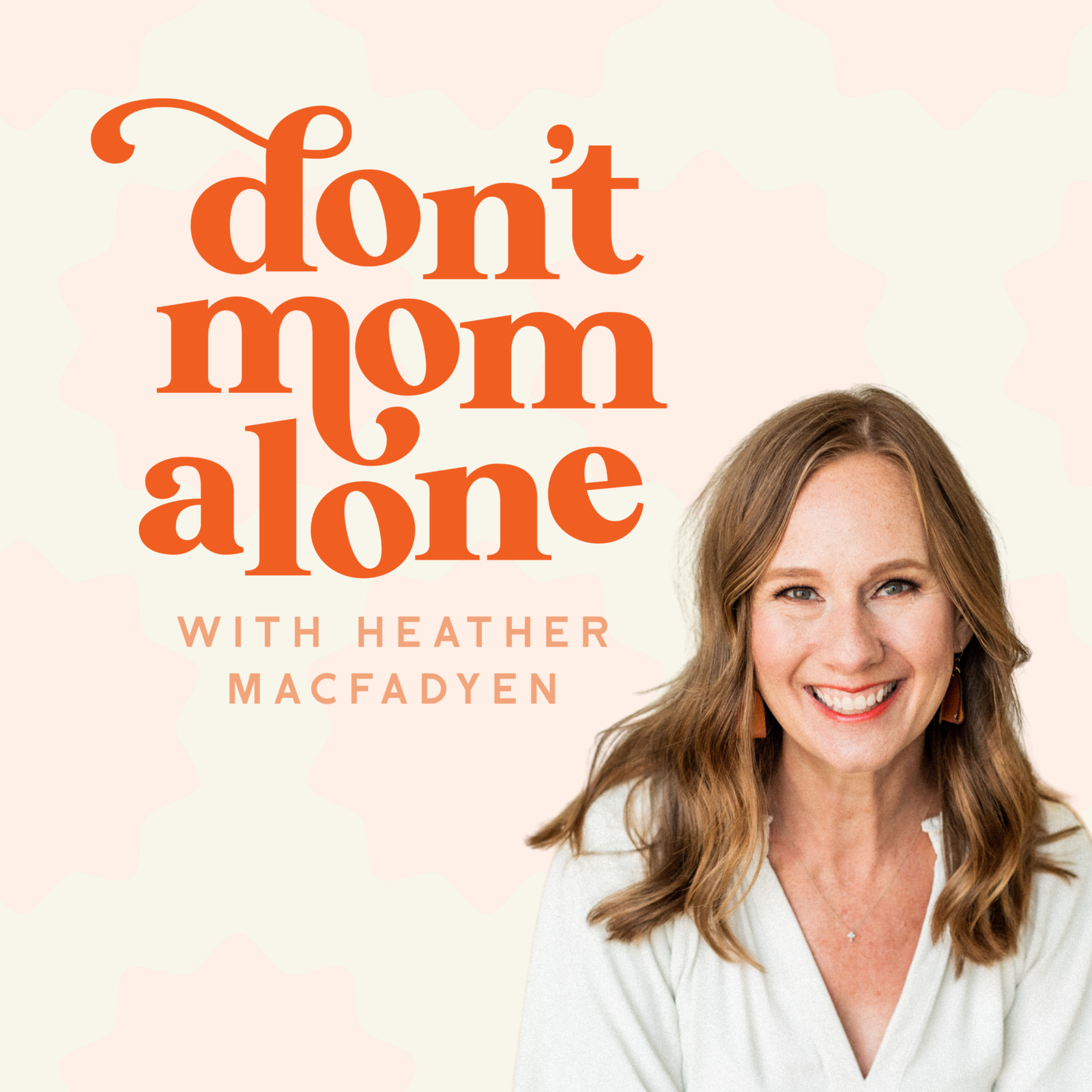
Do Something More-Nonprofit Spotlights & Ways to Serve Your Community
Do Something More is a service-oriented podcast dedicated to sharing inspiring stories of people and organizations who are making a difference. Each week, host Melissa Draper highlights the helpers—volunteers, nonprofits, community leaders, and everyday individuals—who have found meaningful ways to give back and uplift their communities.
Through heartfelt interviews and practical solo episodes, this podcast explores real stories of service, acts of kindness, humanitarian work, and grassroots impact. Listeners will discover simple, actionable ways to serve, volunteer, give back, and create positive change in their own communities.
Whether you’re looking for ways to get involved, searching for volunteer ideas for your family, wanting to support charities you believe in, or simply needing uplifting stories about people doing good, this podcast will motivate you to help, lift, inspire and make a difference.
New episodes every week featuring interviews, nonprofit spotlights, and service-focused conversations.
📩 Contact: dosomethingmore.podcast@gmail.com
📸 Instagram: @dosomethingmore.podcast
Do Something More-Nonprofit Spotlights & Ways to Serve Your Community
89. How to Make Donating a Regular Part of Your Life (Even When You Feel Like You Don’t Have Much to Give)
Giving of our time and volunteering is important and a great way to serve in our communities, but in this episode I’m switching my focus just a little bit and talking about how important it is to donate money and physical goods as well…especially to the nonprofits in our community. Donations, large and small, are their lifeblood and they are truly appreciative of any amount someone can give.
I’m sharing a few tips on how anyone can make donating a regular part of their life by learning how to take advantage of opportunities that pop up every day. These can work even if you feel like you only have small amounts to give, because truly every little bit helps. I know that it is important to many people to be able to donate to the causes that matter to them. I hope this episode can give you some simple ideas on how to make it happen.
Follow the podcast on social media:
Melissa: On the podcast, I talk a lot about giving of our time and our simple acts of service. But I'm switching things up a little bit this week and talking about how donating money, donating financially or with physical goods can also make a difference.
And I'm giving a few tips on how you can make that a regular part of your life.
Welcome to the Do Something More podcast, the show all about service where we highlight the helpers who inspire us all to do something more. If you're passionate about nonprofits or looking for simple ways to volunteer and give back to the causes that matter to you, this is the podcast for you.
I'm your host, Melissa Draper. Stick around and I'll show you all the many ways anyone can truly make a difference in our world today.
Welcome to this episode of the podcast where it's going to be just me, your host, Melissa Draper,
talking to you about how to make donating a regular part of your life,
even when you feel like you don't have much to give. So most of the time on this podcast, we talk about donating our time or those small acts of service that we can do to help and lift those around us.
And that is always important and will always be needed. But today I just wanted to switch things up a bit and talk about the importance of donating our money, donating cash or other physical resources to the nonprofits and charitable organizations in our community.
Those resources can be just as important for the good work that they do and the populations that they serve.
And I know right now especially that money is tight for a lot of people. Resources are tight. People are trying to figure out how to make ends meet or make things work.
And I'm aware of that. But I also know that a lot of people still have that desire to donate and to give back. So that's why I wanted to use this episode to share some simple ideas that really anyone could incorporate into if they're having the desire to give and to help in that way.
Another reason this episode came to mind is that this week, this weekend here in Utah is this huge food drive called the Feed Utah Food Drive. And this happens every year in March on the same weekend.
They've done it for several years now, so people know that it's coming up and it really is a statewide effort. There are different community, church and non profit organizations that come together all over the state of Utah to make this food drive a success.
And they do it in a variety of ways. There's grocery stores that serve as collection points for donations. So people can go there, buy a few things in the grocery store and leave it in the donation spot.
Or also, it's this Saturday. People can leave food on their doorstep by 9am so leave cans of food and then that food is picked up by local youth groups in our communities and taken to the donation sites and distribution centers for food pantries and food banks all over the state.
This is a great effort to be a part of. Everyone can participate in it, even in the smallest and simplest of ways, and it truly does make a difference. So as I thought about that food drive and the opportunity to participate in it, that inspired my idea for this episode and why I wanted to talk about how we can all take part in these opportunities to donate our physical resources or money to the organizations and people that
really need it and can use it in good ways. So I'm going to share several simple pieces of advice that I hope can be beneficial to anyone listening today. And again, the food drive inspired my first piece of advice, and that is to participate in drives.
So there's food drives like this one. Many times at Christmas time, you'll see toy drives or other things. At different points of the year, you might see donation drives for different nonprofits and the efforts and causes that they support.
And these are really a simple thing that anyone can participate in at whatever level works for you. So for this canned food drive, you could go into the store and buy one or two cans for less than $2 and donate them to this cause.
You could even donate a small amount of money. It doesn't have to be much. I remember learning one time from someone who worked at a food bank, and she shared how they can do so much with just $10.
They can do a lot with that $10, more than I can do than if I took that $10 to the store with myself. They can use that because of the resources and connections that they have in the community.
So even small donations in a drive like this can help. As I said, I've participated in other drives. I remember one time a drive where they were trying to collect baby supplies to give to new moms and families with new babies.
And I just went and bought a small package of wipes and donated that to the drive. Wasn't very much money. It was a simple little act, but I knew that I was contributing and helping with something that mattered to me.
So participate in these drives. Find ways that you can donate even just one item to make a difference for these organizations and communities. My second piece of advice is something that me and my husband Started when we were a little younger, we were closer to newlywed age.
And it's that when you're setting up your budget and you're budgeting the different money that you have,
create a random acts of kindness column that you put a few dollars in or lots of dollars if you have that money and want to share it with others. So when we were first married, that column probably just had five or ten dollars a month.
It wasn't much, but we had that so we could use it for the small opportunities that popped up to serve. And because we'd set aside that little bit of we could use it and not worry about having that in our budget.
And of course, as we've grown older and our resources have increased, we've increased that amount. But I love having our random Acts of service column. So I've used it to buy someone's drink ahead of me in line or to donate to an Eagle Scout project.
I remember a few months ago, I was walking out of the grocery store and this boy was collecting money donations for his Eagle Scout project. I was so impressed that he was there.
He, he was champion his cause and talking to people.
And I also really appreciated the cause that he was raising money for. So I had our random Acts of service column. I knew that I could donate $20 to his cause.
So things like that, or maybe it might be for something like making a meal for someone, or sometimes donations pop up for my kids school that I want to donate to.
Or if you're able to put a larger amount in there, maybe you want to give a huge tip the next time you go out to eat. It could be anything.
But having that random acts of kindness column in our budget has opened up all sorts of possibilities. And like I said, when we were first married, it was small, but there were still opportunities that popped up that I could give that little bit that we had to give and it made it easier and a more just regular part of our lives,
something we didn't have to think or stew over as much. And now it's great. I've used it for so many things and it's great to have that. So that would be my next suggestion.
Put a random acts of kindness column in your budget. It can even be just a small amount, even just $5. And use that money for the little service opportunities and chances to donate that pop up in your everyday life along with that same idea.
If you want to give money directly to nonprofits,
many nonprofits have put together small amounts that show you how much that money, what it is exactly going to. And being able to donate in this way can be very encouraging.
It can inspire you to want to continue to donate to causes in this way. So to just explain kind of what I'm talking about here, I'll give some examples. So a few months ago on the podcast, we featured the nonprofit charity Vision, and they help with sight impairments all over the world.
But on their website, they advertise clearly, just $10. Just donating $10 to them gets someone a pair of eyeglasses. And you can give that donation and say, this is what I want it to go to.
Another nonprofit that I thought of that we featured last year is the Magic Yarn Project. They make wigs for children fighting cancer. And on their site, they say just $25.
A $25 donation can go to create one of these wigs for a child with cancer. And I'm going to be featuring a nonprofit soon called the Crayon Initiative.
And for them, they say just $1.46 gives a pack of crayons to a sick child in a hospital. $1.46 donation. So many nonprofits have these kind of incremental donations that you can give, and I love seeing those, and I love donating to them when I have the opportunity, because,
again, I think being able to see that our money is going to a cause that's important to us or see where it's specifically being used can help us feel like we're truly making a difference, and it can encourage us and have a little more security in the future.
Donations that we make. And another tip along with that is to participate and be part of groups that. That do regular giving.
So I've mentioned many times before on here, I am part of a group called 100 Women who Care. And this group gathers quarterly. We hear from nonprofits in our community, and then we choose one to pool our money to give to.
So it's $100 at each meeting, $100 a quarter, and we pool all those $100 together to give a larger donation to these nonprofits. And I love going to these meetings.
They're just four times a year. It's not a huge commitment, but they allow me to become acquainted with the nonprofits in my community.
They give me the opportunity to regularly learn about these charities, to really see the work that they're doing and be informed about them, and to see where our donation and my money is going.
And it's great. And because this is just a regularly recurring thing that I've chosen to be a part of, and it makes donating to these nonprofits a regular part of my life.
And you don't have to join a formal group like this one. You can create your own group in your neighborhood. A couple episodes ago, we had our guest mention how her neighbors decided to come together.
And instead of doing neighbor gifts or neighbor treats that year, they all donated a little bit of money to the nonprofit that she was over. So they collected this money and it came together to an amount that really was helpful for her and her small nonprofit and that was really appreciative.
So you can do things like that. You can do small little drives in your neighborhood, donation drives for different organizations that could use those resources,
or you could even do a drive at work. I know other people have done those kinds of things at their workplace. So you can participate in groups that are organized in doing it, or you can organize a one time group and donation for your own community.
But being part of a group and doing it together with a group again inspires good feelings and really helps you see where your money is going to and where it is making a difference.
So those are some of my ideas on how you can make donating a regular part of your life. And I hope you could see that that is true. Even when you feel like you don't have much to give, every small amount helps.
So my four pieces of advice were to participate in drives when you have the chance. If you live here in Utah, it's coming up this Saturday, put a couple of cans of food on your porch and participate in this food drive.
Number two was to create a random acts of kindness column in your budget, even if it's just a small amount of five or ten dollars, and use that for small opportunities that pop up in your everyday life to give.
Number three was to look for nonprofits that ask for small amounts that you can donate, that show you where that money is going to and that can encourage you in your donation efforts.
And number four was to be part of a group that does regular giving so that it can become a part of your everyday life as you participate in that group or even have the courage and initiative to start a group yourself.
And the final thought, I want to leave here as I've interacted with many nonprofits since I started this podcast. And the people that run them,
they are truly grateful for any help that you can give. Whether you're giving $10 or $10,000,
it makes a difference and it truly matters to each of these nonprofits.
They live on donations. Yes, they need time. Yes, they need volunteers. And yes, they appreciate all of it, but a lot of them, these donations, even small donations, are their lifeblood.
And I know for myself it can be so empowering to contribute financially to a cause that matters to me and that's important to me. Sometimes there's things I can't do to make a difference.
I haven't ever felt inspired to start a nonprofit, and there are some causes that I know leave us feeling heartbroken. For the people that are walking through some of these difficult things.
And being able to donate financially, even just a little bit, is a really gratifying experience. And maybe it's gratifying because I like to give time, too, and I do that as well.
But. But I truly know as I talk to these nonprofits that every small amount matters. So if you felt that nudge to donate and to give financially, to give money or to give physical goods, follow through on that and don't feel embarrassed by whatever amount you give.
Even if it's small, it truly can make a difference. So thank you so much for listening to the podcast today. I want to give you the friendly reminder that every small review also makes a difference for the podcast.
So if you've listened to this podcast and it's brought inspiration and joy to your life, please leave us a review on Apple Podcasts or Spotify or wherever you get your podcasts.
Or you can share this episode with a friend or as always, follow us on social media. I have the links to all of those in the show notes.
And of course, this week, I hope that you can find a way to do something more to help lift, inspire, fire, or make a difference.
Podcasts we love
Check out these other fine podcasts recommended by us, not an algorithm.

The Ramsey Show
Ramsey Network
Crystal Paine Show
Crystal Paine
All In
LDS Living
Sunday Sitdown with Willie Geist
Willie Geist, Sunday TODAY
Come Back Podcast
Ashly Stone
Don't Mom Alone Podcast
Don't Mom Alone Podcast